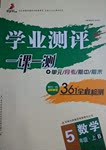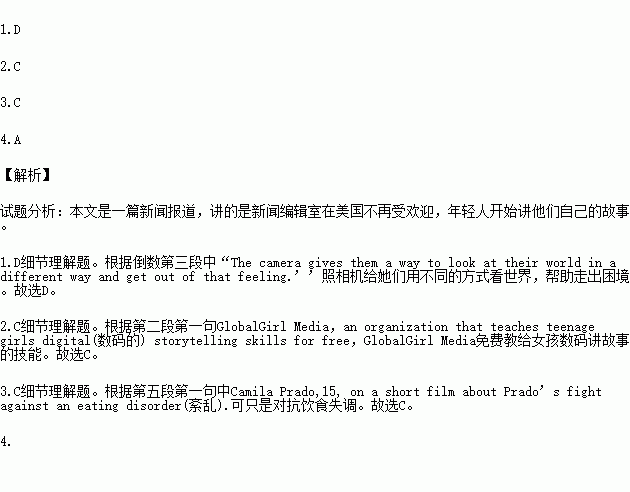题目内容
Now that newsrooms(新闻编辑室) are becoming less popular in the US,young people have begun to tell their own stories.
GlobalGirl Media,an organization that teaches teenage girls digital(数码的) storytelling skills for free,was started by award-winning filmmakers Amie Williams and Meena Nanji in Los Angeles in 2010.
“By giving girls a voice,you introduce a different story,and change the existing one,”said Danny Glover,a member of the GlobalGirl Media organization.
“When the camera’s in my hands,I feel like I can’t lose,”Said Cheyenne Grisez,14.“It makes me happy and I feel like I can do anything.”
On the final day of the summer academy in California,Williams worked with Grisez and Camila Prado,15, on a short film about Prado’s fight against an eating disorder(紊乱). In the film,Prado bravely interviewed her parents and sister about how she was able to beat her bad feelings and eating disorder. This film and others the girls had made were shown to parents and friends on the last day of the academy, celebrating their hard work.
“It’s their story,and nobody knows how to tell it better than they do.”Williams said.
“These girls are from really difficult backgrounds. They feel trapped sometimes. They feel alone.”Williams said.“The camera gives them a way to look at their world in a different way and get out of that feeling.’’
Girls in the program practice their skills and build confidence by going out in the community and interviewing people for the short films.Many of them had no experience, but found they had good storytelling skills.
“I work with these girls. Every day I leave gratefully,because I know that.due to the work we're doing with them,things will be better,”said GlobalGirl Media summer academy project director Heather Faison.
1.Why do many American girls like to tell stories using the camera?
A.Their parents hate to give them a hand.
B.They desire to improve their photo skills.
C.They can make profits from their documentaries.
D.The camera can help them out of their trouble.
2.What do we learn about GlobalGirl Media from the text?
A.It was founded by the government.
B.It gets much money from girl students.
C.It gives girls digital storytelling skills.
D.It has newsrooms in California.
3.What difficulty did Prado overcome by making her film?
A.Self-harm. B.Poor school scores.
C.An eating disorder. D.Teenage difficulty.
4.Who directed GlobalGirl Media summer academy project in California?
A.Heather Faison B.Amie Williams.
C.Danny Glover. D. Meena Nanji
 学业测评一课一测系列答案
学业测评一课一测系列答案书面表达
目前,不少人在写作文或交流时喜欢使用网络语言。就此现象,你班最近举行了一场讨论。请根据下表的提示,客观地介绍讨论的情况及你的观点。
40%的同学认为 | 60%的同学认为 | 你的观点 |
1. 有点荒诞,有时让人无法理解 2. 违背了汉语的语法规则,对学习毫无帮助 | 1. 幽默,使语言更生动 2. 有助于表达思想 | 1.… 2. … |
荒诞ridiculous
注意:
1. 对所给提示,不要简单翻译,可适当增加细节,使行文连贯。
2. 词数150左右。开头已给出,不计入总词数。
Nowadays, with the development of the Internet, there came a kind of language called Web Language.
_____________________________________________________________________________________
_____________________________________________________________________________________
_____________________________________________________________________________________
_____________________________________________________________________________________
_____________________________________________________________________________________
_____________________________________________________________________________________


 ),并在其下面写出该加的词。删除:把多余的词用(\)划掉。
),并在其下面写出该加的词。删除:把多余的词用(\)划掉。